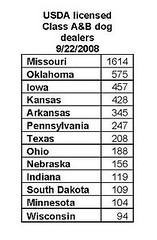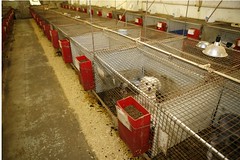A Crash Course
A Crash Course in 2008
Click here to watch the Podcast
Many have heard of the USDA (it’s stamped on organic food labels, meat labels, and other everyday grocery store items), and many have heard of puppy mills. But the fact that puppy mills are regulated by the USDA is a little-known fact to most people.
The US Department of Agriculture seems like a strange entity to be in charge of regulating the puppy industry, but that’s how it works. To be clearer, the Animal and Plant Health Inspection Services (APHIS) is the arm of the USDA in charge of regulating puppy mills under the Animal Welfare Act. There are currently 5,913 dog breeders and brokers with USDA licenses. People often wonder whether there is a list of all the puppy mills in the country. Well, the USDA is the first place to look.
 In April, Oprah Winfrey aired an hour-long show about puppy mills, and the same day, the USDA published a FAQ on animal dealers. Note the paragraph to the right—the first frequently asked question: "who regulates puppy mills?" Answer: the USDA.
In April, Oprah Winfrey aired an hour-long show about puppy mills, and the same day, the USDA published a FAQ on animal dealers. Note the paragraph to the right—the first frequently asked question: "who regulates puppy mills?" Answer: the USDA.**Note that the USDA has since changed the language to read: "Who regulates commercial dog breeders?"
For a list of USDA licensed commercial dog breeders (or puppy mills—call them what you like), click here.
What many people also don’t realize is that under the Freedom of Information Act, we are all entitled to view not just a breeder’s name and address, but their inspection reports are included as well. Curious about a breeder? Order their inspection reports. You can do it online by clicking here.
What’s NOT inspected by the USDA?
-Retail pet stores. The USDA only regulates the supply end—the breeders.
-Puppy sales on the Internet, classified ads, flea markets. NO regulation
-Small-scale breeders who have three or fewer breeding female dogs. NO regulation
 70 inspectors for 10,000 facilities
70 inspectors for 10,000 facilitiesIn addition to inspecting and watching over commercial dog kennels, APHIS inspectors are also in charge of inspecting research facilities, zoos and circuses, airport terminals—they are in charge of inspecting the care, handling and housing of everything from dogs to dolphins. This document, published on APHIS’ website, has this to say about the inspectors themselves:
"[Animal Care] inspectors receive special training in the proper care of marine mammals, exotic animals, and animals used in research. Inspectors also receive extensive training in how to conduct inspections at airport terminals, zoos, and commercial animal breeding facilities, among others. APHIS currently has more than 70 AC inspectors in the United States, who are strategically placed where regulated facilities are located."
The total number of active licensed facilities listed on the APHIS website is 9,883. At first glance, seventy inspectors for nearly 10,000 facilities sounds like a miniscule number of people doing a colossal job but if you do the math, it adds up to about one facility per day per inspector.
 What compliance means with the AWA
What compliance means with the AWAIt’s important to note exactly what inspectors are looking for when they arrive at a USDA licensed kennel. Their job is to make sure breeders are adhering to the minimum standards set forth by the Animal Welfare Act (AWA). They can look at a facility with hundreds of dogs in small cages, desperate for human attention, and note no violations.
That’s because the AWA does nothing to ensure dogs are happy, or live a quality life. It’s not written into the regulations, and therefore is not something the USDA enforces. Here are some quick facts about the minimum standards set forth by the USDA:
-Inspections are "Risk-based," meaning that facilities that meet a certain criteria are inspected "as seldom as once every 2 to 3 years." (source)
-Cage size: must be 6 inches larger than the size of the dog, on all sides
-Up to 12 dogs can be housed in one cage
-Dogs never have to be let out of their cages. Breeders only need to have an exercise plan
-There is no limit to the number dogs a breeder can have—many have over 1,000
-There is no age limit for breeding dogs. If a dog is able to produce puppies for ten years, that’s how long they could be in the facility
For the full text of the federal Animal Welfare Regulations, click here.
Bad Kennels Stay in Business
One of the most common complaints about the USDA from animal advocates is that breeders can have repeated and long-standing violations, but continue to sell hundreds of puppies to pet stores. Below are several reports of large, USDA-licensed Minnesota kennels that have multiple USDA violations and dozens of reports of sick puppies sold in stores. Click the links below to see the reports, courtesy of Pet Shop Puppies Inc. Note that some have even been investigated by local news stations and have been charged with animal cruelty by the state. (**Note, the top of the report includes puppies the breeder has sold, and the bottom includes USDA inspection violations, news exposés and other investigations, if any.)
Wanda McDuffee
Angie & Gerry Wensmann
Kathy Bauck
What all this means, and what you can do:
1.) Support new legislation that will amend the Animal Welfare Act. The Puppy Uniform Protection Act (PUPS) is on the docket for the 2008-2009 session. Click here for more information (**For one example of a notorious kennel that currently does not need a USDA license under the AWA, visit this case on the CAPS website)
2.) Watch and share the Best Friends Podcast about the USDA and puppy mills: Click here to view. You can also subscribe to the podcast for regular video updates.
3.) USDA-licensed kennels supply pet stores. If you disagree with the way the USDA regulates these kennels, never, ever buy a puppy from a pet store. Share this article and the podcast with others who might not know about the pet store/puppy mill connection.
4.) Test your knowledge of the USDA’s regulation of puppy mills with this online quiz from www.PetShopPuppies.org
5.) If you know people who don’t understand or believe where pet store puppies come from, print this article and have them take it to a pet store and ask whether the puppies in the store come from USDA-licensed kennels. (The answer—legally—is yes.)
6.) For nine things you can do to help stop puppy mills, visit the Resources section of the Best Friends campaign website
1 comment:
2008 There were 4644 Class A Kennels not 10,000
Post a Comment